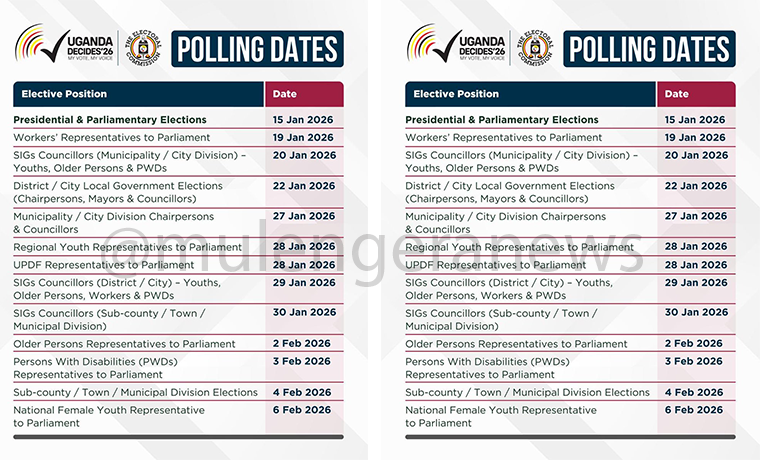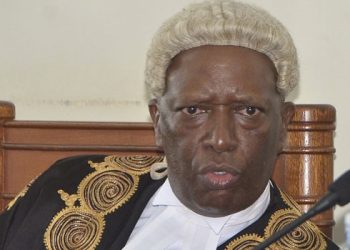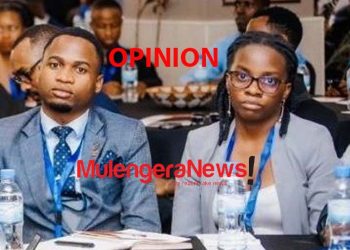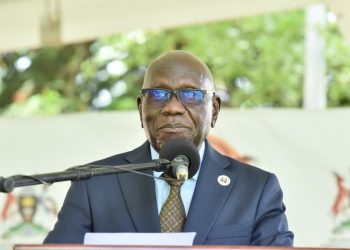By Wafula Malik
Ex-Chief Justice Wako Wambuzi’s opening remark was a reference to history. It was about the gruesome murder of Uganda’s native pioneer Chief Justice Benedicto Mugumbya Kiwanuka under whom he served as a budding native high court judge in post-independence Uganda. On invitation by Chief Justice Bart Katurebe, Wambuzi was at the High Court grounds to address judges and hundreds of lawyers reflecting on the Kiwanuka he knew and closely worked with as well as the values he lived and died for. To his credit, a clearly humbled Wambuzi preferred to address the extent to which the circumstances of Kiwanuka’s death are relevant to Uganda’s contemporary politics and generally the way the country is being governed. Venue was the Judiciary headquarters near City Square where more than 1,000 stakeholders gathered to listen to him deliver Kiwanuka inaugural lecture. The tragic event he candidly memorized occurred on 21st September 1972. 46 years ago. It was on 21st September 1972 and addressing judges and members of the legal fraternity at the Thursday lecture, Wambuzi regrettably noted not much had changed in the adversarial relationship between judiciary and executive. He said whereas Chapter 8 of the Constitution speaks of independence of the judiciary, there isn’t much practically showing such an ideal situation is prevalent in Uganda when one reflects on the state of democracy and rule of law. The much revered Wambuzi noted that since the colonial period, Uganda has had the misfortune of having a judiciary that was cautious and defensive of executive interests. Calling upon everyone present to reflect on what he was saying, Wambuzi stopped, paused and asked his audience (that included Minister Sam Kutesa) “what would Ben Kiwanuka be saying to us today?” He said it was important for all judicial officers to conduct business in way that shows Ben Kiwanuka didn’t die in vain.

TARGETING M7?
In a presentation some construed to be critical of President Museveni’s governance style, Wambuzi said contemporary Ugandan leaders haven’t only let down Ben Kiwanuka and the ideals he died for but have also failed to comply with minimum standards set by the African Commission which is an arm of African Union. The highly scholarly ex-CJ run through the African Commission minimum standards on appointment and posting of judges; sufficiently funding the judiciary, judges’ conditions of work and independence which covers things like security of tenure. Far away from these ideals, Wambuzi noted in Uganda the executive practice is to intimidate judges. He cited numerous examples from our recent history. He also rebuked state functionaries and politicians who, with impunity, defy court orders. He recalled the 2004 incidence when court invalidated the referendum Act angering President Museveni who appeared on TV and said judges should concentrate on deciding cases of chicken thefts and leave governance matters to NRM. He also highlighted the two incidents of paramilitary groups storming court rooms to re-arrest suspects that had been granted bail in 2005 and 2007. He also didn’t spare Minister Frank Tumwebaze whose November 2013 KCCA session to impeach Lord Mayor Erias Lukwago he disapprovingly referred to. Wambuzi said whereas this is some many people trivialized, easily forgot and moved on, it will forever remain condemned and unacceptable that a Minister could proceed with impeachment proceedings even after the existence of a freshly- issued court order prohibiting the same had been brought to his attention. Wambuzi said the subsequent physical wounding of lawyer Abdullah Kiwanuka (who came to serve the order to the Minister suffered as his protruding belly was rolled on the tamarack) made the state action seem even more contemptuous of the court system.
CONDEMNS KITATA;
Saying these are things Ben Kiwanuka would have firmly responded to, Wambuzi made reference to the Abdul Kitata group that raided the Makindye Magistrate Court premises prompting lawyers and Magistrate Richard Mafabi to flee for dear lives. He said this convinced many that all manner of attack would be occasioned on the judiciary and the offending groups would politically get away with it. The Kitata group stormed court to protest the private prosecution of then IGP Kale Kayihura which Magistrate Mafabi had permitted. Wambuzi commended Katureebe for issuing a comprehensive response sternly warning the executive against recurrence of such conduct. He added “but we need to hear many more of those.” Wambuzi, who these days actively belongs to the Elders Forum which late last year openly rejected extension of age limit in the constitution to permit the incumbent’s continued stay, also went against President Museveni more directly when he disapprovingly referred to his July 2018 address in Entebbe where the head of state said the judges aren’t (and shouldn’t pretend to be) in charge of the country because it’s the NRM and its MPs that are in charge. Museveni was furious that the Constitutional Court, sitting in Mbale, had invalidated a legislation that expanded the MPs’ term of office by two years. Many expected Museveni to be full of praises for the judges since his age limit thing was saved but he surprised many, and made Ugandans even angrier, when he described the Mbale ruling as not pleasant enough yet it’s something over which larger sections of society ridiculed the Constitutional Court. “This [M7 comments] suffocates and disempowers the judiciary coupled with chronic underfunding,” Wambuzi said.

CRIPPLING JUDGES;
Wambuzi said denial of sufficient funding is one way through which the Museveni government undermines judiciary independence because even basic operational expenses can’t be met. He referred to former DCJ/Ag CJ Steven Kavuma’s speech in the FY215/16 in which he said only 0.6% of the national budget had that year been allocated to the judiciary. He said by refusing to sufficiently fund the judiciary, the Museveni government was responsible for why the Constitutional Court Justices operate next to a bar and restaurant renting on the same (Twed) building. He recalled a 2013 incident when the roof at Twed caved in and created panic among Constitutional Court Justices operating there. He also referred to courts which operate in rented premises and some that are housed in district premises upcountry. “This is not conducive at all. It only makes judges less robust and inefficient,” he said. Such inefficiencies, coupled with the bench being understaffed as well as refusal to recruit enough prosecutors in the DPP’s office, Wambuzi said are the reason for case backlog which leave citizens frustrated with delayed access to justice. On what today’s judicial officers must learn from Ben Kiwanuka, Wambuzi said they must stand firm and fearlessly speak out “to end impunity by state actors which is a problem today as much as it was” in Kiwanuka’s time. He added that “to have many Ben Kiwanukas on the bench today, judicial officers’ integrity should be unquestionable as well as professionalism.” To emulate Ben Kiwanuka, he noted, judicial officers don’t have to really join politics or anything like that but to “speak truth to power through court decisions and other options available.” Wambuzi counseled that, whereas it’s desirable, emulating Kiwanuka won’t be without judicial officers inviting risk to themselves including being called names “but you shouldn’t be found wanting.” Gratefully, he said, the current Chief Justice Bart Katureebe is firm and outspoken each time the judiciary is attacked. “He [Bart] did well firmly responding to the events in the Makindye Magistrates court…we need to hear more of those,” Wambuzi said. As if to impute bad motives on the NRM regime, Wambuzi also wondered why the 1995 constitution was used to diminish the Chief Justice’s involvement in the recruitment of judicial officers. He recalled that the 1967 Constitution made the CJ the chairman of the Judicial Service Commission which recruits and disciplines judicial officers. He said it’s anomalous that the CJ, DCJ and Principal Judge (the three are the topmost figures in the judiciary) don’t directly participate in the recruitment of judges by the JSC. He said the trio’s involvement is important in ensuring only people who pass the fit and proper person test are appointed and retained on the bench. He castigated as improper and disrespectful the practice by police and army to arrest and bring suspects before court to be formally charged before proper investigations are conducted. “How do you first arrest people and investigate later?” Wambuzi said this is clear abuse of court process and shows bad faith and disrespect by the executive. He also denounced torture of suspects saying “this is a very big problem in Uganda today which the judiciary must urgently address.” Vehemently condemning soldiers who moved into parliament and beat MPs last year, Wambuzi said it would be deceptive for anyone to expect the judiciary to be allowed its independence when the other arm of government (parliament) is unable to legislate independently. These things, he said, are inter-related making it necessary for both MPs and judges to work towards each other’s wellbeing. “Parliament should respect the judiciary and vice versa. That is the only way to achieve democratic governance as committed to in the 1995 constitution,” he said regretting the fact that the very high democratic hopes the 1995 constitution inspired have all been betrayed. “I did my part and I left 18 years ago. It’s now the turn of Chief Justice Bart Katureebe to take the judiciary forward but he must be supported by other judiciary staff,” he said adding that practices like case files going missing will always dent the judiciary’s image however much the CJ can be well intentioned. “That is the only way we can honor and exemplify the rich legacy of Ben Kiwanuka.” At the conclusion of Wambuzi’s submission, there was a standing ovation and consensus was he had spoken very well about the fallen CJ under whom he started his career decades ago as a high court judge. Katureebe had earlier praised Wambuzi for being an excellent chief justice in the late 1980s after Museveni capture of power. “I recall that time when I was the Attorney General in government and Minister of Justice. The government had showed displeasure [about judiciary decisions] and Chief Justice Wambuzi summoned me along with Justice Kanyeihamba. He said to me we can’t come out as judges to respond to government. It has to be you the AG to explain to your colleagues in cabinet how these things work. I look forward to a day when I will also be able to summon Gen Otafiire [today’s Justice Minister] and speak to him the way Chief Justice Emeritus did that day,” Katureebe said as he called Wambuzi to speak. For comments, call, text or whatsapp us on 0703164755.
































